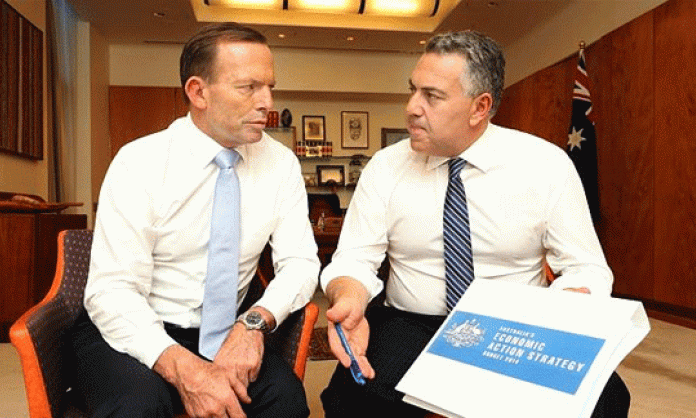$40 billion sounds like a lot of money. That’s the forecast budget deficit this year, up $10 billion on budget estimates last May and growing by the month.
The government says that we have no alternative but to swallow some bitter medicine in order to deal with this “debt crisis”.
A lot of this so-called crisis is a smokescreen to cover the government’s agenda of stealing from the poor and giving to the rich. The Australian government is not about to go broke. In fact, it has one of the lowest levels of debt in the OECD. But, for the sake of argument, let’s say the government was right that something needs to be done urgently.
It would be very easy to pay down the debt and eliminate wasteful government spending, while simultaneously increasing living standards for workers and pensioners.
The simplest way would be to get the rich to pay tax. Between 2006 and 2012, Labor and Coalition governments made a series of income tax cuts, forgoing more than $71 billion every year from the top 10 percent of income earners, according to a 2014 Australia Institute policy brief. Reversing those cuts would put the government in surplus within 12 months.
An extra 5 percent tax on earnings greater than $1 million a year would yield another $1 billion that could be used to expand rather than trash the welfare state.
The Australia Institute also estimates that eliminating superannuation tax concessions for the top 10 percent of income earners would raise somewhere in the order of $15 billion in 2017 alone.
Forcing Australia’s top 200 companies to pay tax at the statutory rate of 30 percent would raise an extra $8.4 billion every year. Currently, 29 percent of these companies pay tax at just 10 percent or less, and the average across all of them is 23 percent, according to an analysis by the Tax Justice Network.
Then you could hit the banks. In 2014, the big four racked up $29 billion in profits, much of it from working class mortgagers, from whom banks make a whopping 40 percent return on equity.
Taxing the revenues earned in Australia by overseas-owned multinationals would throw billions more dollars to the government – of their total income in 2012 of $760 billion, they claimed a taxable income of just $50 billion, on which they paid tax of just $12 billion. Companies such as Apple, Google and Ikea pay virtually nothing.
But far from cracking down on tax avoidance, the federal government is aiding and abetting it. Just before Christmas, it scrapped plans to crack down on multinational tax deductions worth $600 million. Other, similar, measures are likely to save big business another $500 million. That’s more than $1 billion lost. Then there’s the repayment of $882 million by the Tax Office to NewsCorp in 2013; let’s get that back off Rupert Murdoch.
Tax avoidance by the top end of town is only likely to get worse. The government is sacking thousands of ATO staff – 4,700 jobs have gone or are going. Stripped of staff, the ATO is now outsourcing tax auditing and compliance work to the Big Four accountancy firms – the very companies that cook the books for big business and ensure they pay little or no tax!
Next, cancel all the subsidies to the mining industry which, in the case of the federal government, would tip another $4.5 billion into Treasury every year and in Queensland another $1.4 billion.
End the handouts to privatised operators of toll roads and utilities. In 2013 alone, the Victorian government paid $1.6 billion to private operators of train and bus services.
Eliminate the $5.6 billion paid every year to subsidise the private health insurers, whose premiums rise at three times the rate of inflation. Putting, say, $4 billion of that money back into the far more efficient public health system would still leave $1.6 billion to spare for budget repair.
Wipe out the various tax lurks given to landlords – there’s $7 billion straightaway, and with a bonus that housing might become more affordable for prospective owner-occupiers as well. Eliminating exemptions on capital gains tax for owners of mansions would also provide the treasurer with a few billion more.
Stop handing out money to the posh private schools. One quarter of the $48 billion spent by government on schools in 2012-13 went to the non-government sector. Obviously not all of this went to Scotch College or King’s, but if we put a stop to even one tenth of this, that’d generate $1 billion a year in savings.
These simple measures alone would reap more than $100 billion every year. That’s the $40 billion deficit wiped and over the course of the next decade hundreds of billions to put into things like new hospitals, schools, public housing, vital infrastructure, job creation, better pensions etc.
That the Liberals won’t even consider these sorts of changes is testimony to their support for the rich. They bang on about “intergenerational theft” – but the real theft is going on right in front of our eyes, supported by the Liberal government.









